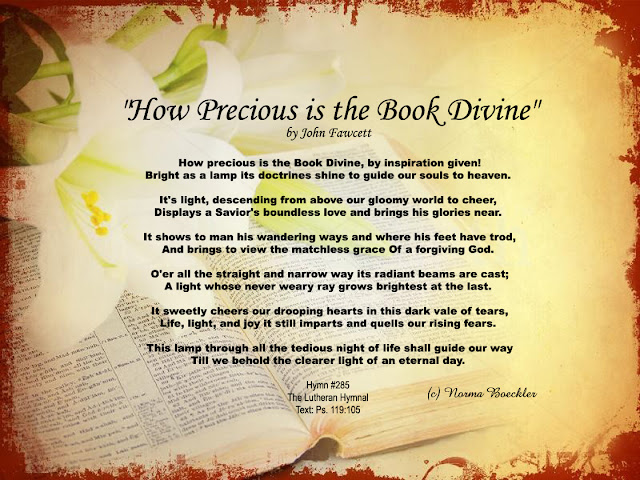 |
| The New Ten Commandments - by Mark and Avoid Jeske |
Old Testament - The Torah, Prophets, and Writings
In
Judaism, the Old Testament (tanakh) is divided into three sections:
1.
The Torah consists of the Five Books of Moses
2.
The Prophets are all the prophetic books
3.
The Writings include the rest of the 39
books of the Old Testament.
Many consider the Old
Testament to be exclusively law, condemning sin, and the New Testament to be
Gospel, showing us the Savior.[1]
The Hebrew word torah does not mean law, but teaching, so it includes
not only law, but God’s blessings and Gospel Promises. If we think of that
meaning in Psalm 1, the message is one of daily guidance for all Christians. Luther
practiced it, considering the meaning of passages and words for days.
Psalm
1:1 Blessed is the man that walketh not in the counsel of the ungodly, nor
standeth in the way of sinners, nor sitteth in the seat of the scornful.
2
But his delight is in the teaching (torah) of the Lord; and in his teaching
(torah) doth he meditate day and night.
Equally important, the
Old Testament holds Christ the way a cradle holds a baby. We may not see the
baby in its cradle at first, but we hear the voice and see the movement of the child's blanket.
The Five Books of Moses contain the ore from which the divinity of Christ is
fashioned in the New Testament, as Luther wrote.
When Adam and Eve were
expelled from the Garden for disobedience, God promised the Savior, the First
Gospel – Genesis 3:15 – “And I will put enmity between thee and the woman, and
between thy seed and her seed; it shall bruise thy head, and thou shalt bruise
his heel.” And so the Savior would be harmed, but Satan would be vanquished,
forever injured by the power of the Gospel.
Eve believed the Promise
and thought her newborn boy was the Savior. The Hebrew clearly states in Genesis
4:1 – “I have gotten a man, the Lord.”
Abraham believed that
he would begin a line leading to the Son of David establishing an ever-growing
and eternal kingdom – he was justified by faith in Jesus Christ. Genesis 15:6 “And
he believed in the Lord; and he counted it to him for righteousness.” The Apostle
Paul argued repeatedly that Abraham was justified by faith.
Exodus
The Exodus is more
about the Son of God than spoiling the Egyptians.[2]
When Moses saw the
Burning Bush in Exodus 3:2, two natures were united – the fire and the bush,
and yet the fire did not consume the bush. “Behold, the bush burned with fire,
and the bush was not consumed.” Likewise, the Two Natures of Christ,
human and divine, are united in One Person.
God called from the
Bush and identified in a three-fold manner, the God of Abraham, Isaac, and Jacob.[3]
When Moses asked for the Name of God, He said, “Tell them I AM sent me to you.”
(Exodus 3:14)
When the religious
opponents claimed Abraham as their father, Jesus said, “Before Abraham was, I
AM,” which only God could declare. (John 8:58) The I AM passages in the Fourth
Gospel are God’s Name. That is why the opponents picked up rocks to stone Him.
A lamb without blemish provided
the blood for the doorposts, so the Angel of Death would pass over the homes
and spare the first-born sons, establishing the Passover Meal, foreshadowing
the Lord’s Supper. Exodus 12. This also began the custom of “What does this
mean?” for Lutheran catechism.
The Son of God led them
out of Egypt, as a pillar of cloud by day and as a pillar of fire by night. 1
Corinthians 10:4.
Water miraculously came
from a rock, John 4.
God provided bread from
heaven, John 6.
One of the strangest stories
in the Exodus was the command to place a brass serpent on a pole to cure the
poisonous bite of the serpents, Numbers 21:9. “And Moses made a serpent of
brass, and put it upon a pole, and it came to pass, that if a serpent had
bitten any man, when he beheld the serpent of brass, he lived.” But the meticulous
calendar of Promises is solved by Jesus Himself –
John
3:13 And no man hath ascended up to heaven, but he that came down from heaven,
even the Son of man which is in heaven. 14 And as Moses lifted up the serpent
in the wilderness, even so must the Son of man be lifted up: 15 That whosoever
believeth in him should not perish, but have eternal life. 16 For God so loved
the world, that he gave his only begotten Son, that whosoever believeth in him
should not perish, but have everlasting life. 17 For God sent not his Son into
the world to condemn the world; but that the world through him might be saved. 18
He that believeth on him is not condemned: but he that believeth not is
condemned already, because he hath not believed in the name of the only
begotten Son of God.
[1] Jesus
taught the greatest sin, the foundational sin, is not believing in Him. John 16:8ff.
Therefore, the primary and essential work of the Christian Church is to teach
faith in the Son of God, the Savior.
[2]
Fuller Seminary devotees use Augustine’s “spoiling the Egyptians” phrase to
justify themselves for copying the Enthusiasm of Gospel salesmen, marketing
marvels, and hocus-pocus professionals.
[3] With the help of a Lutheran teacher, I gathered the Trinitarian passages in the Bible – The Holy Trinity Revealed in the Scriptures. It is great to have assistants when I need them.


